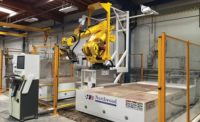Pokarna, a leader among stone producers in India, recently opened its Cream Cashmere granite quarry in Buduruvada Village, Parvathipuram Mandal, Vizianagaram District, Andhra Pradesh, India. The almost 25-acre site currently produces three shades/patterns of the material — with Cream Cashmere being the only one presently named.
“It’s a brand new quarry,” said Paras Kumar Jain. “It took us almost three years to get approvals from all the concerned authorities, including from the environment and pollution-control department, as well as the department of mines and geology.”
According to Jain, Pokarna started exploration approximately 10 months ago, and has recently entered into the production phase. “We consider stone as a fashion product and not as a commodity,” explained Jain, when discussing some reasons for opening the quarry. “As in the fashion industry, we are also in constant search of new tones and patterns. We have a team of dedicated geologists who travel across mountains, forests and deserts looking for world-class stone deposits.”
Currently, Pokarna produces roughly 4,400 cubic feet of Cream Cashmere granite every month. “The production potential is very encouraging and large,” said Jain. “We plan to increase production gradually in line with the demand.”
On average, a typical extracted block measures 8.5 x 4.6 feet or larger. “While we always try to quarry gangsaw-sized blocks, at the same time, we have to keep blocks to a certain size because trucks can only carry a certain amount of weight,” he explained. “We have deployed several new generations of state-of-the-art mining equipment, including excavators from Volvo, compressors from Doosan and wire saw from Optima.”
In addition to extracting blocks using modern technology, such as diamond wire saws and slot drills, Pokarna also uses time-tested traditional techniques of “feather and wedge” to break the blocks. A staff of 25 workers is in place to keep the site operational year round.
“We have just started exporting to the U.S.,” said Jain. “Initial production was processed for a very large healthcare project in India. We see the U.S., Europe and India as primary markets.”











